
aps-toolkit
An Libray Unlock BIM Data With Autodesk Platform Services
Stars: 60
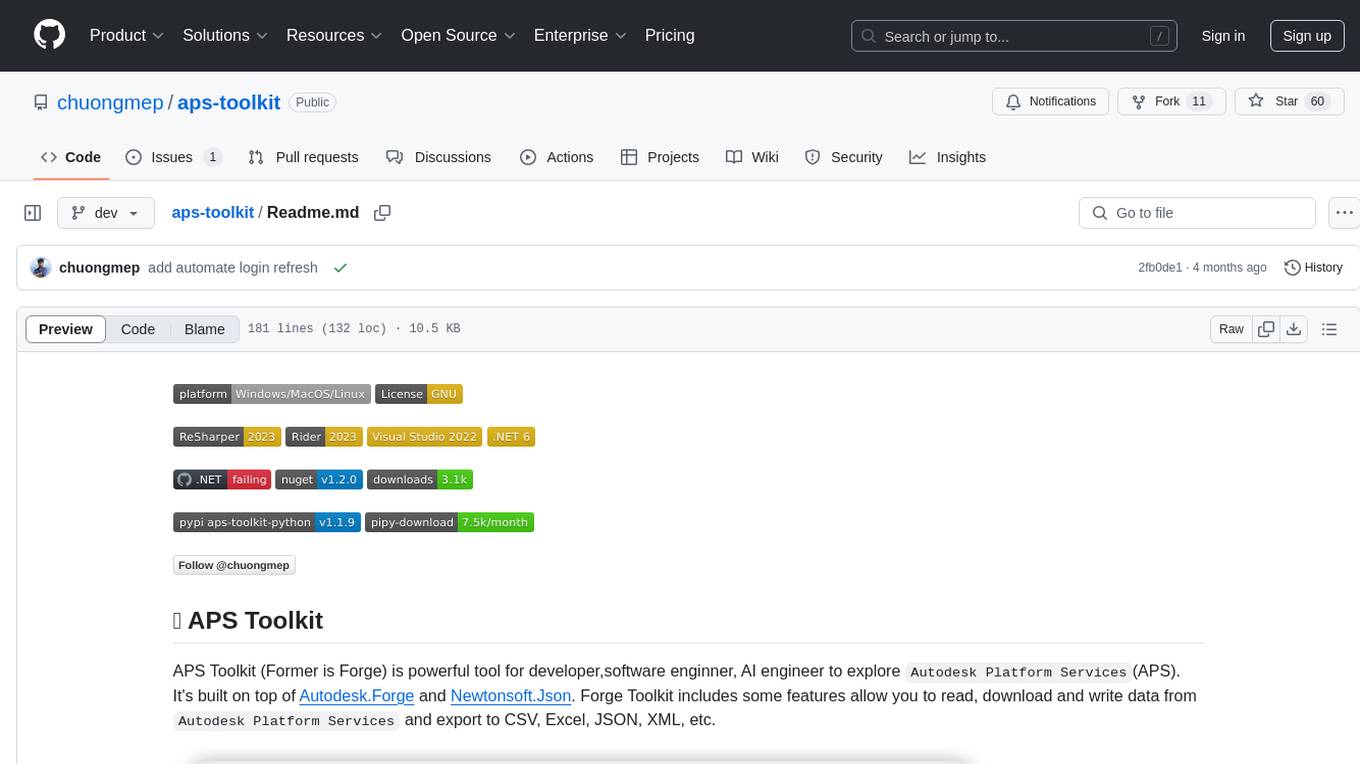
APS Toolkit is a powerful tool for developers, software engineers, and AI engineers to explore Autodesk Platform Services (APS). It allows users to read, download, and write data from APS, as well as export data to various formats like CSV, Excel, JSON, and XML. The toolkit is built on top of Autodesk.Forge and Newtonsoft.Json, offering features such as reading SVF models, querying properties database, exporting data, and more.
README:

APS Toolkit (Former is Forge) is powerful tool for developer,software enginner, AI engineer to explore Autodesk Platform Services(APS). It's built on top of Autodesk.Forge and Newtonsoft.Json. Forge Toolkit includes some features allow you to read, download and write data from Autodesk Platform Services and export to CSV, Excel, JSON, XML, etc.
- [x] Read/Download SVF Model
- [x] Read/Query Properties Database SQLite
- [x] Read/Download Properties Without Viewer
- [x] Read Geometry Data
- [x] Read Metadata
- [x] Read Fragments
- [x] Read MeshPacks
- [x] Read Images
- [x] Export Data to CSV
- [x] Export Data to Excel
- [x] Export Data to Parquet
Please follow latest update at APSToolkit Nuget
<PackageReference Include="APSToolkit" Version="1.*" />Please follow latest update at APSToolkit Python
pip install aps-toolkit --upgradeBefore start you need setup your environment:
APS_CLIENT_ID = <your client id>
APS_CLIENT_SECRET = <your client secret>Advanced setup for APS Toolkit environment:
APS_REFRESH_TOKEN = <your refresh token>
APS_ACCESS_TOKEN = <your access token>
APS_CLIENT_PKCE_ID = <your client id>I want export Revit Data To Excel 👇
using APSToolkit;
using Autodesk.Forge;
using APSToolkit.Database;
using APSToolkit.Auth;
var token = Authentication.Get2LeggedToken().Result;
string urn = "<Derivative URN>";
var RevitPropDbReader = new PropDbReaderRevit(urn, token);
RevitPropDbReader.ExportAllDataToExcel("result.xlsx");from aps_toolkit import Auth
from aps_toolkit import PropDbReaderRevit
auth = Auth()
token = auth.auth2leg()
urn = "<Derivative URN>"
prop_reader = PropDbReaderRevit(urn, token)
df = prop_reader.get_data_by_category("Ducts")
df.save_to_excel("result.xlsx")All Tutorials are available under Jupyter Notebook at .NET Tutorials
- 00. Jupyter Notebook And .NET Interactive
- 01. Setup And Authentication
- 02. Explore Hubs - Projects - Items - URN
- 03. Explore Versions Item and Derivative Urn
- 04. Explore General Metdadata With APSToolkit
- 04.01. Explore Revit Data With APSToolkit
- 05. Explore Access APS Database And Execute Query
- 06. Explore SVF Format - Export SVF Viewer
- 07. Explore Update Revit Data Back To ACC
- 08. Explore Pull Data From ACC BIM360 API
- 09. Explore Data Knowledge Use LLM Agent
- 10. Build Pipeline Data Process with APSToolkit
- 11. Visualization Data - Data Analyst
- 12. Custom Python In .NET Interactive
- 13. Custom Metadata Export
All Tutorials are available under Jupyter Notebook at Python Tutorials
- 00. Jupyter Notebook And Python
- 01. Setup And Authentication
- 02. Explore Hubs - Projects - Items - URN
- 03. Explore Versions Item and Derivative Urn
- 04. Explore General Metdadata With APSToolkit
- 05. Explore Access Database And Query Items
- 06. Data Visualization - Analyst BIM Model
- 07. Explore Big Data Format Storage
- 08. Explore URL ACC Extract
- 09. Explore SVF - Export SVF Viewer
Many source codes here are collected from open-source authors under the MIT License. Without their sharing and contributions, I wouldn't be able to do this. I am deeply grateful to them, and therefore, I hope that if you are using this tool, please thank them before thanking me and follow their licenses.
This project is licensed under the terms of the gnu-gpl-v3.0. Some part of the project base on the licese follow the original project :
- Autodesk.Forge - The .NET SDK for Autodesk Forge.
- Newtonsoft.Json - Json.NET is a popular high-performance JSON framework for .NET.
- CsvHelper - Library to help reading and writing CSV files.
- EPPlus - EPPlus is a .NET library that reads and writes Excel files using the Office Open XML format (xlsx).
- ChoETL - Cinchoo ETL is a code-based ETL framework for extracting data from multiple sources, transforming, and loading into your very own data warehouse in .NET environment. You can have data in your data warehouse in no time.
- SharpZipLib - SharpZipLib (#ziplib, formerly NZipLib) is a compression library for Zip, GZip, BZip2.
- Pandas - Pandas is a fast, powerful, flexible and easy to use open source data analysis and data manipulation library built on top of the Python programming language.
- Nuke - Nuke is a cross-platform build automation system with C# DSL for tasks such as compiling code, copying files and folders, running unit tests, compressing files and building NuGet packages.
Please read CONTRIBUTING.md for details on our code of conduct, and the process for submitting pull requests to us.
Thanks JetBrains for providing a free All product IDE for this project.
This is not an official Autodesk product to support for Autodesk Platform Services. Use it at your own risk.
I'm not responsible for any data loss or any other issues caused by using this library, some features need require cost for using. Please read carefully the Autodesk Forge and Autodesk Platform Services terms of use. I'm just doing, testing , maintaining in free time, so feel free to contribute and make it better.
Update : There is a new, official Node.js/TypeScript SDK that's currently in beta but will be stabilized soon. That SDK will offer various benefits over forge-server-utils, for example, it will be easier to maintain and extend in the future as it's being auto-generated from OpenAPI specs. As soon as it's ready to use (which should be really soon), I would archive this project and point to the official SDK instead.
For Tasks:
Click tags to check more tools for each tasksFor Jobs:
Alternative AI tools for aps-toolkit
Similar Open Source Tools

aps-toolkit
APS Toolkit is a powerful tool for developers, software engineers, and AI engineers to explore Autodesk Platform Services (APS). It allows users to read, download, and write data from APS, as well as export data to various formats like CSV, Excel, JSON, and XML. The toolkit is built on top of Autodesk.Forge and Newtonsoft.Json, offering features such as reading SVF models, querying properties database, exporting data, and more.

eidos
Eidos is an extensible framework for managing personal data in one place. It runs inside the browser as a PWA with offline support. It integrates AI features for translation, summarization, and data interaction. Users can customize Eidos with Prompt extension, JavaScript for Formula functions, TypeScript/JavaScript for data processing logic, and build apps using any framework. Eidos is developer-friendly with API & SDK, and uses SQLite standardization for data tables.
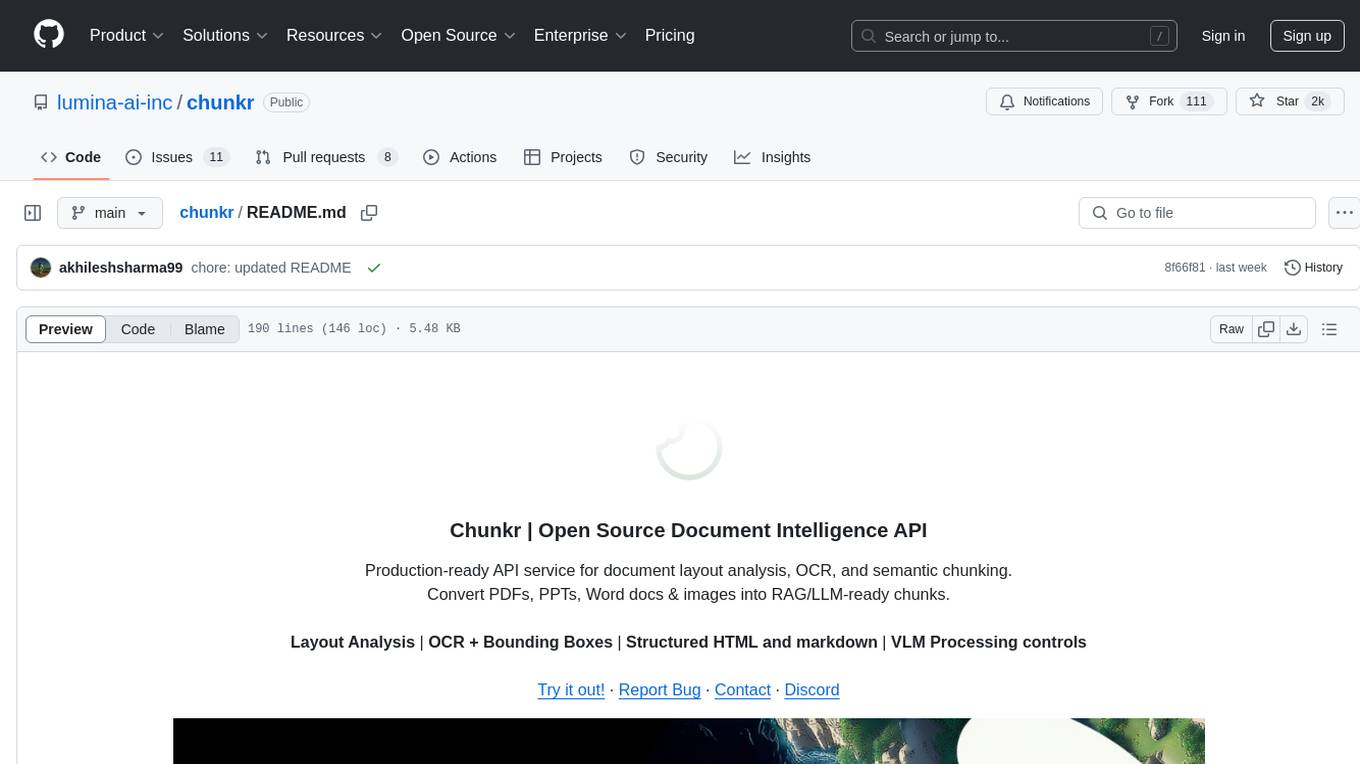
chunkr
Chunkr is an open-source document intelligence API that provides a production-ready service for document layout analysis, OCR, and semantic chunking. It allows users to convert PDFs, PPTs, Word docs, and images into RAG/LLM-ready chunks. The API offers features such as layout analysis, OCR with bounding boxes, structured HTML and markdown output, and VLM processing controls. Users can interact with Chunkr through a Python SDK, enabling them to upload documents, process them, and export results in various formats. The tool also supports self-hosted deployment options using Docker Compose or Kubernetes, with configurations for different AI models like OpenAI, Google AI Studio, and OpenRouter. Chunkr is dual-licensed under the GNU Affero General Public License v3.0 (AGPL-3.0) and a commercial license, providing flexibility for different usage scenarios.
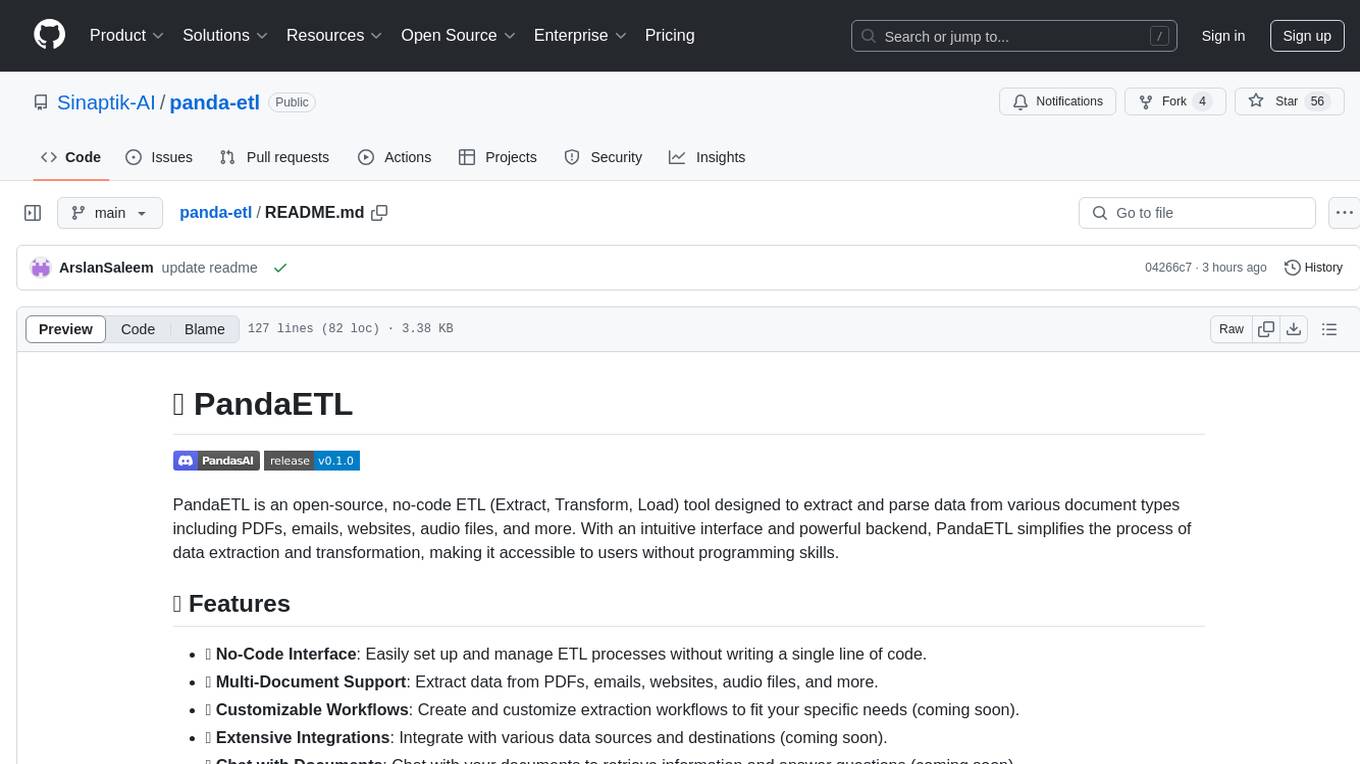
panda-etl
PandaETL is an open-source, no-code ETL tool designed to extract and parse data from various document types including PDFs, emails, websites, audio files, and more. With an intuitive interface and powerful backend, PandaETL simplifies the process of data extraction and transformation, making it accessible to users without programming skills.
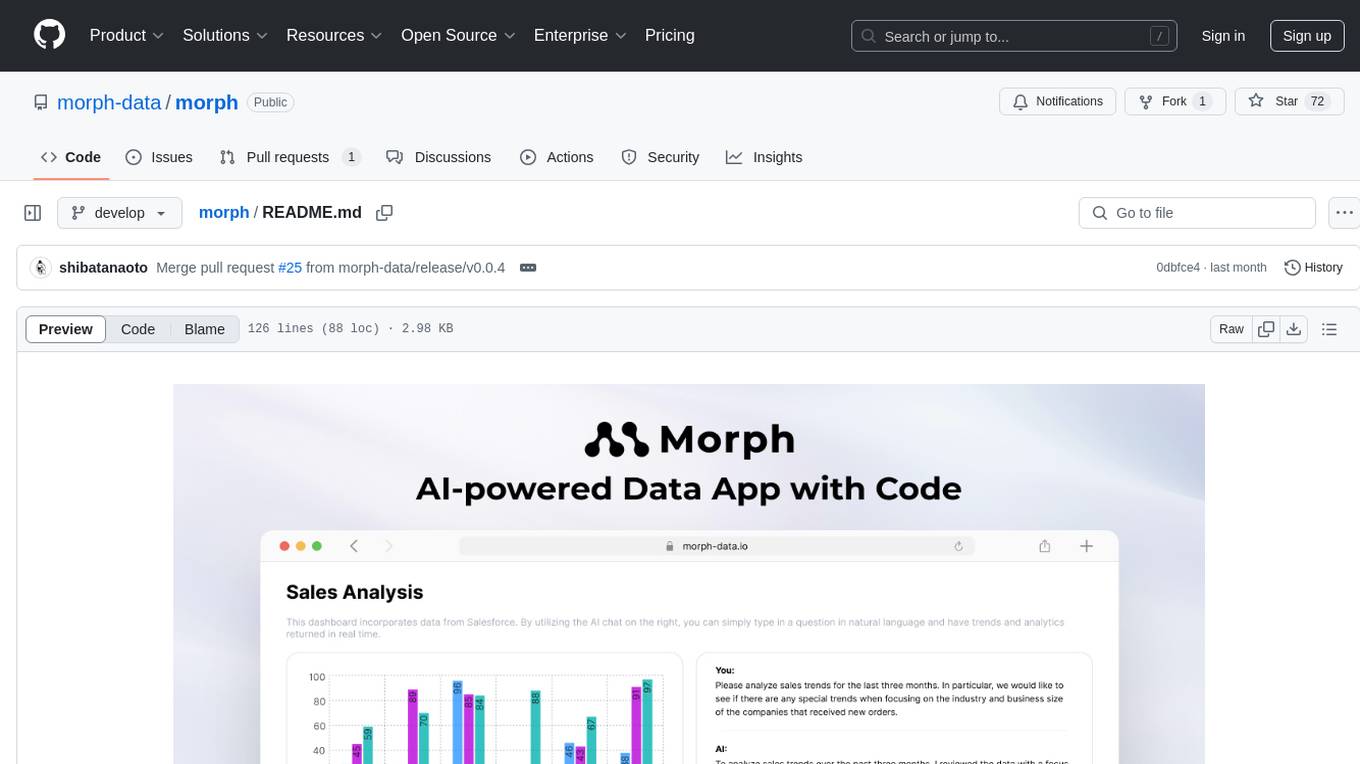
morph
Morph is a python-centric full-stack framework for building and deploying data apps. It is fast to start, deploy and operate, requires no HTML/CSS knowledge, and is customizable with Python and SQL for advanced data workflows. With Markdown-based syntax and pre-made components, users can create visually appealing designs without writing HTML or CSS.

agentcloud
AgentCloud is an open-source platform that enables companies to build and deploy private LLM chat apps, empowering teams to securely interact with their data. It comprises three main components: Agent Backend, Webapp, and Vector Proxy. To run this project locally, clone the repository, install Docker, and start the services. The project is licensed under the GNU Affero General Public License, version 3 only. Contributions and feedback are welcome from the community.
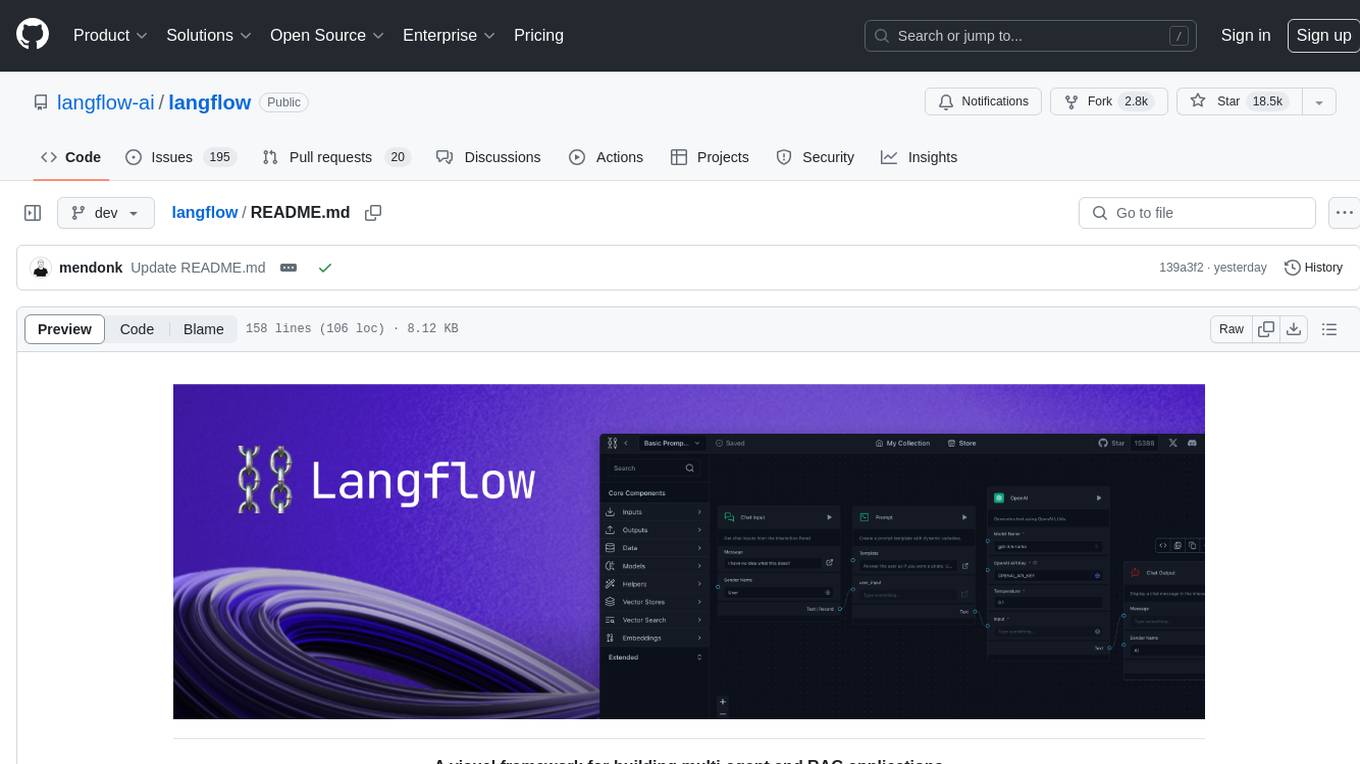
langflow
Langflow is an open-source Python-powered visual framework designed for building multi-agent and RAG applications. It is fully customizable, language model agnostic, and vector store agnostic. Users can easily create flows by dragging components onto the canvas, connect them, and export the flow as a JSON file. Langflow also provides a command-line interface (CLI) for easy management and configuration, allowing users to customize the behavior of Langflow for development or specialized deployment scenarios. The tool can be deployed on various platforms such as Google Cloud Platform, Railway, and Render. Contributors are welcome to enhance the project on GitHub by following the contributing guidelines.
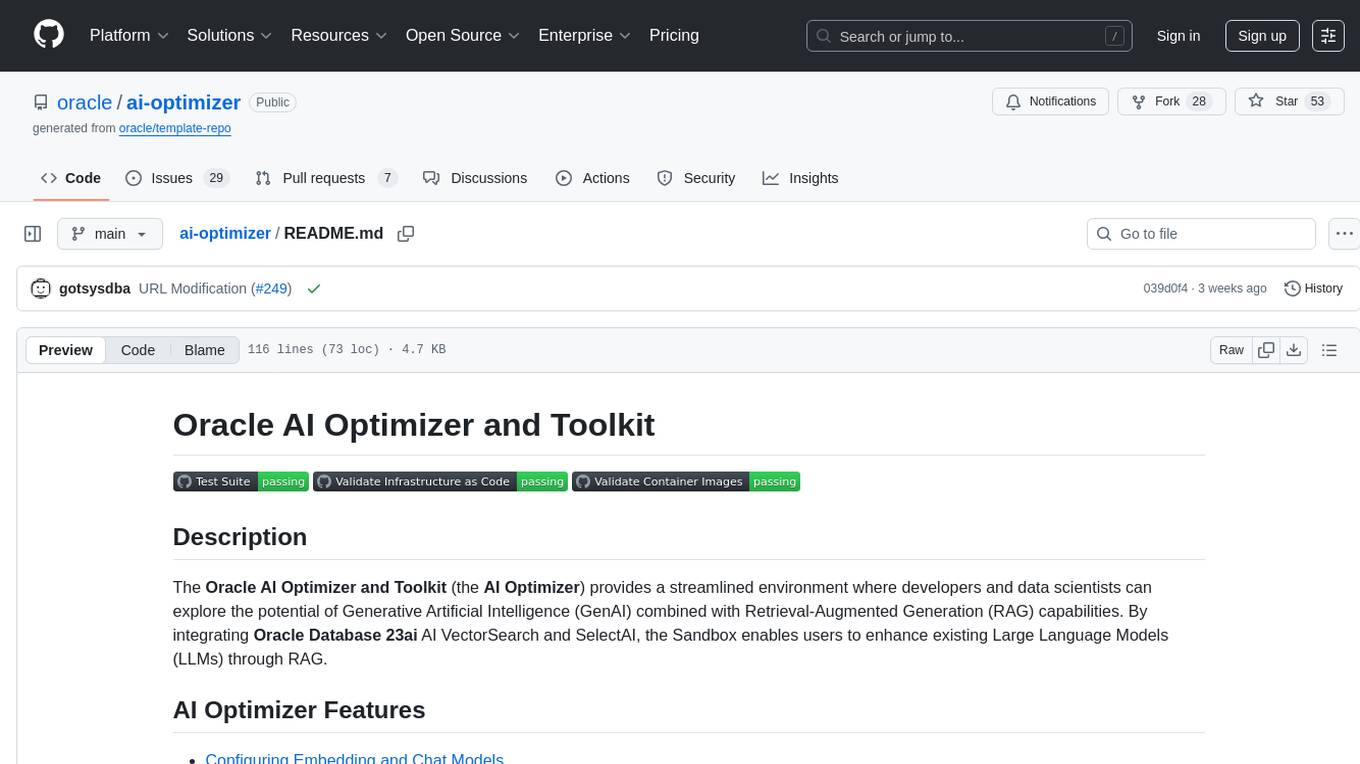
ai-optimizer
The Oracle AI Optimizer and Toolkit provides a streamlined environment for developers and data scientists to explore Generative Artificial Intelligence (GenAI) and Retrieval-Augmented Generation (RAG) capabilities. It integrates Oracle Database 23ai AI VectorSearch and SelectAI to enhance Large Language Models (LLMs) through RAG.
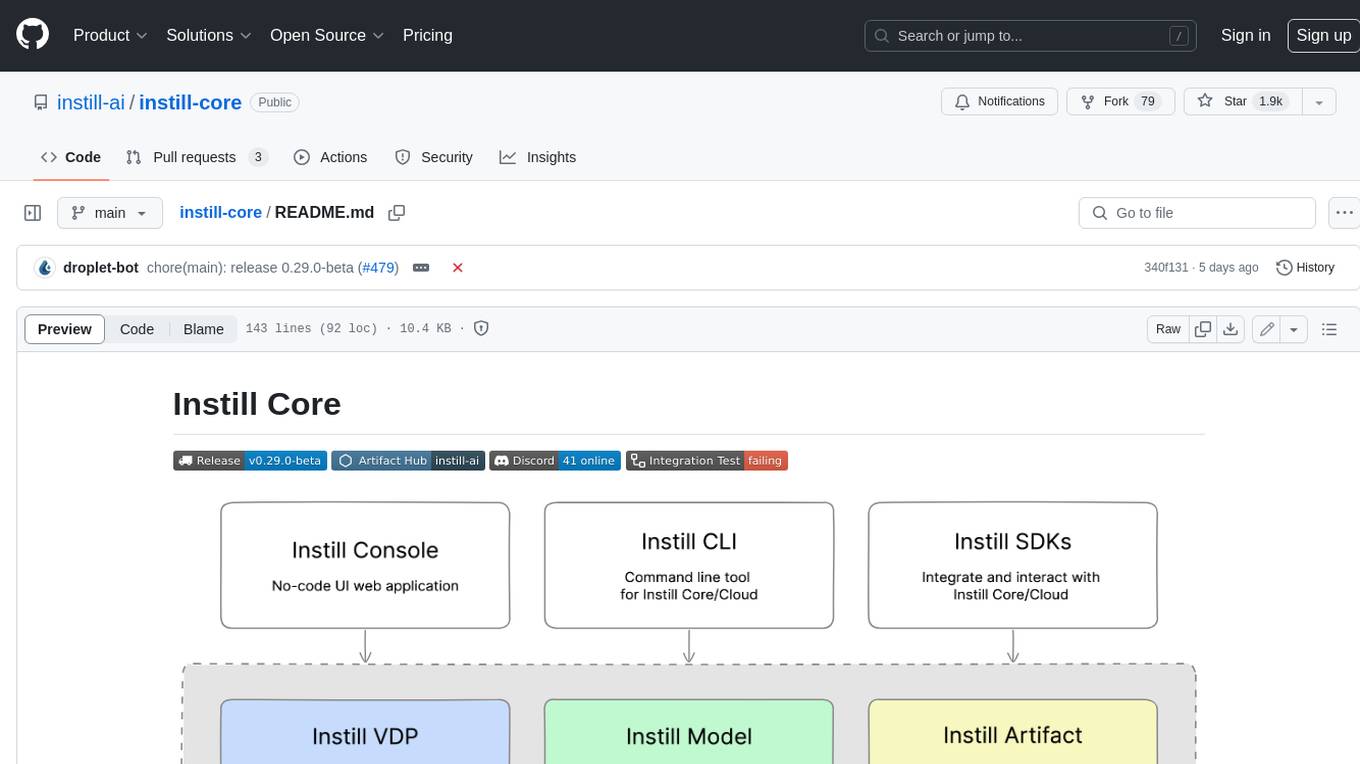
instill-core
Instill Core is an open-source orchestrator comprising a collection of source-available projects designed to streamline every aspect of building versatile AI features with unstructured data. It includes Instill VDP (Versatile Data Pipeline) for unstructured data, AI, and pipeline orchestration, Instill Model for scalable MLOps and LLMOps for open-source or custom AI models, and Instill Artifact for unified unstructured data management. Instill Core can be used for tasks such as building, testing, and sharing pipelines, importing, serving, fine-tuning, and monitoring ML models, and transforming documents, images, audio, and video into a unified AI-ready format.

swark
Swark is a VS Code extension that automatically generates architecture diagrams from code using large language models (LLMs). It is directly integrated with GitHub Copilot, requires no authentication or API key, and supports all languages. Swark helps users learn new codebases, review AI-generated code, improve documentation, understand legacy code, spot design flaws, and gain test coverage insights. It saves output in a 'swark-output' folder with diagram and log files. Source code is only shared with GitHub Copilot for privacy. The extension settings allow customization for file reading, file extensions, exclusion patterns, and language model selection. Swark is open source under the GNU Affero General Public License v3.0.

TaskingAI
TaskingAI brings Firebase's simplicity to **AI-native app development**. The platform enables the creation of GPTs-like multi-tenant applications using a wide range of LLMs from various providers. It features distinct, modular functions such as Inference, Retrieval, Assistant, and Tool, seamlessly integrated to enhance the development process. TaskingAI’s cohesive design ensures an efficient, intelligent, and user-friendly experience in AI application development.
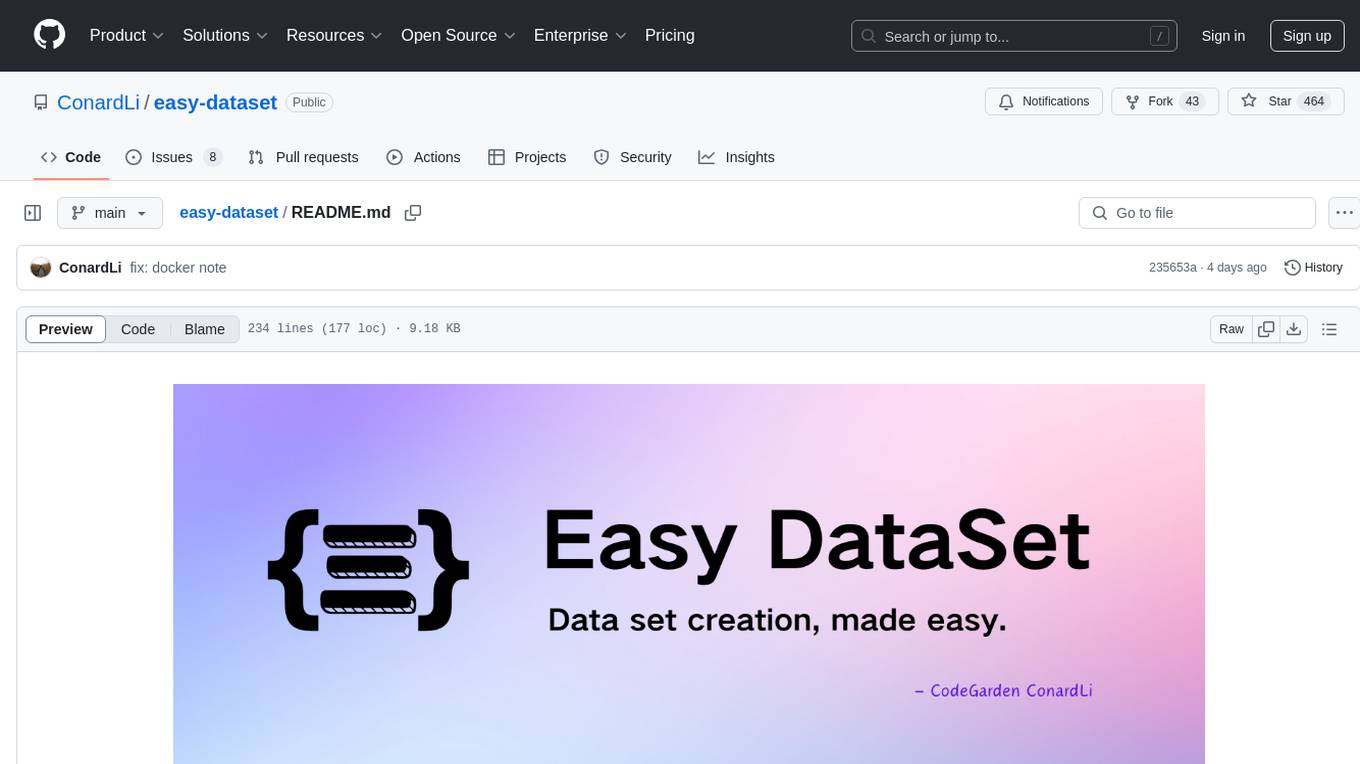
easy-dataset
Easy Dataset is a specialized application designed to streamline the creation of fine-tuning datasets for Large Language Models (LLMs). It offers an intuitive interface for uploading domain-specific files, intelligently splitting content, generating questions, and producing high-quality training data for model fine-tuning. With Easy Dataset, users can transform domain knowledge into structured datasets compatible with all OpenAI-format compatible LLM APIs, making the fine-tuning process accessible and efficient.
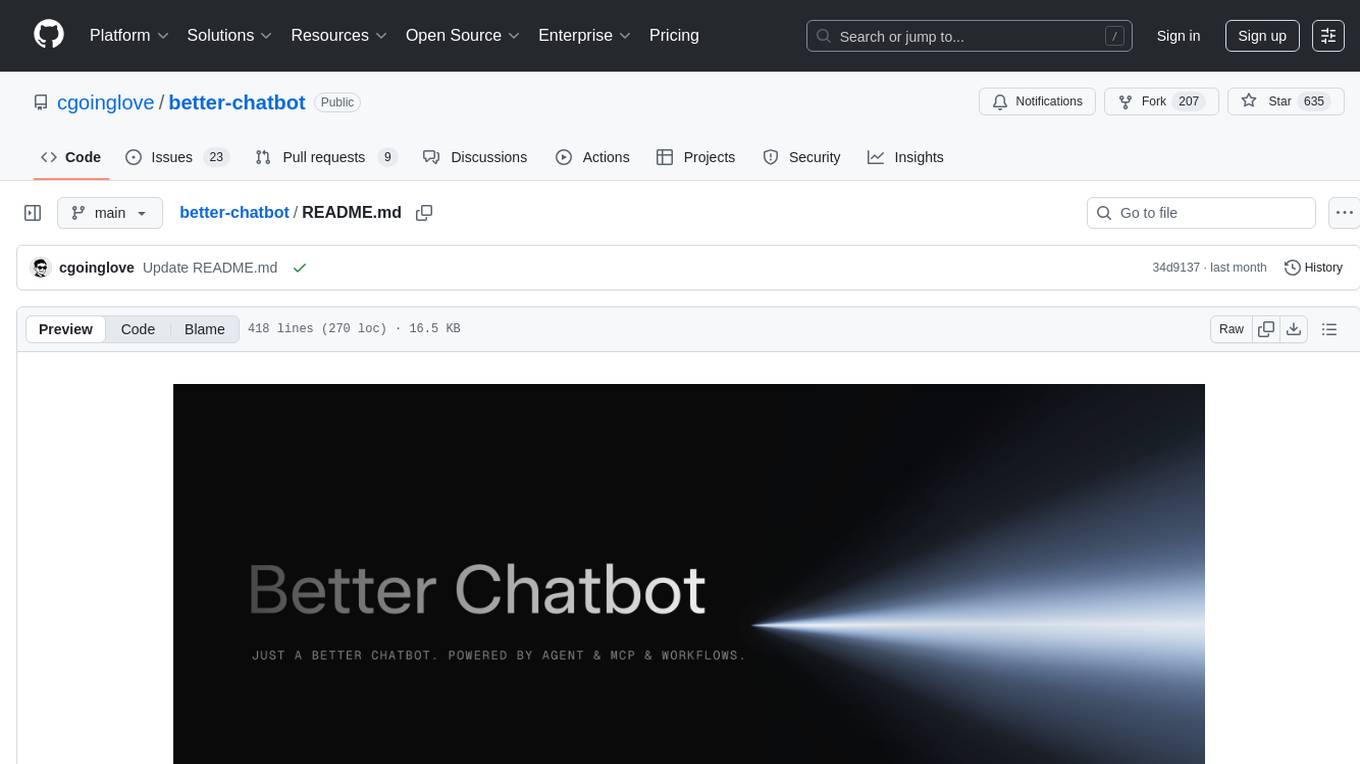
better-chatbot
Better Chatbot is an open-source AI chatbot designed for individuals and teams, inspired by various AI models. It integrates major LLMs, offers powerful tools like MCP protocol and data visualization, supports automation with custom agents and visual workflows, enables collaboration by sharing configurations, provides a voice assistant feature, and ensures an intuitive user experience. The platform is built with Vercel AI SDK and Next.js, combining leading AI services into one platform for enhanced chatbot capabilities.
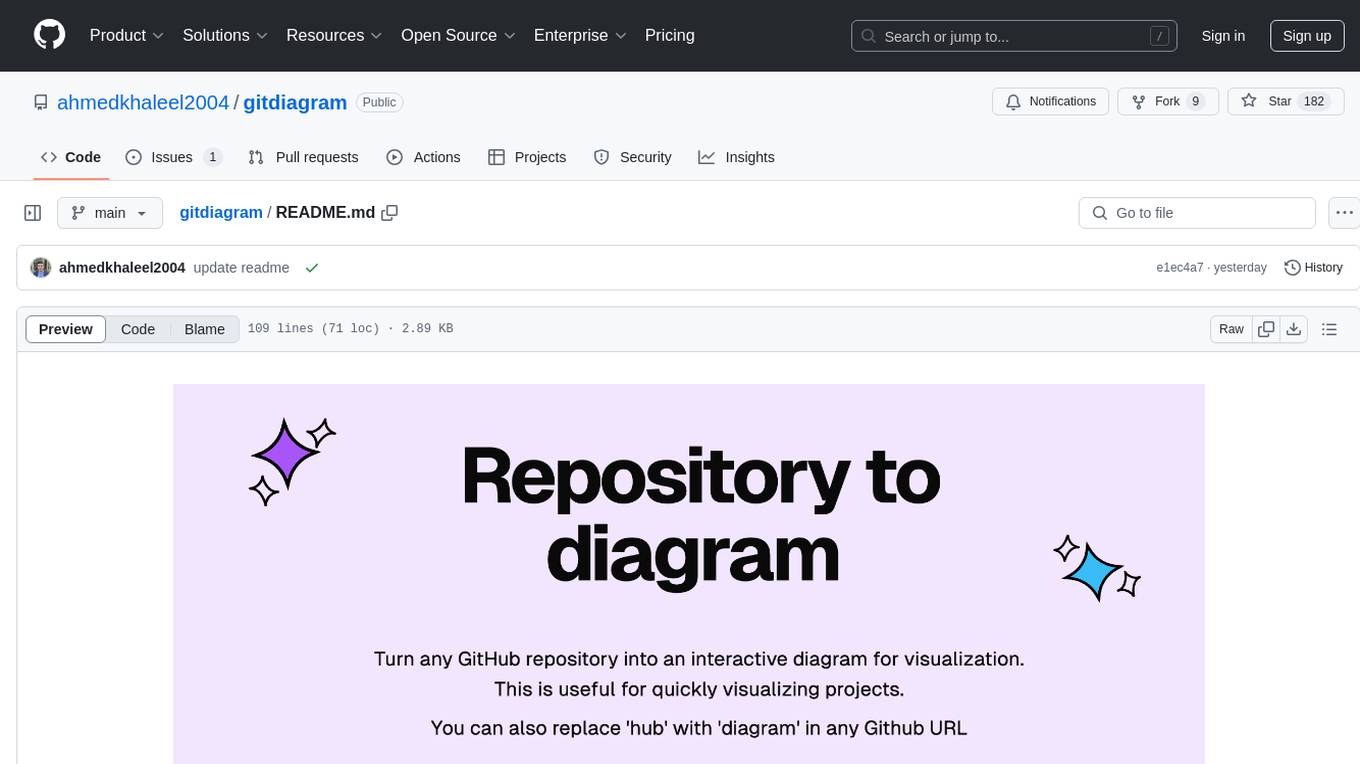
gitdiagram
GitDiagram is a tool that turns any GitHub repository into an interactive diagram for visualization in seconds. It offers instant visualization, interactivity, fast generation, customization, and API access. The tool utilizes a tech stack including Next.js, FastAPI, PostgreSQL, Claude 3.5 Sonnet, Vercel, EC2, GitHub Actions, PostHog, and Api-Analytics. Users can self-host the tool for local development and contribute to its development. GitDiagram is inspired by Gitingest and has future plans to use larger context models, allow user API key input, implement RAG with Mermaid.js docs, and include font-awesome icons in diagrams.
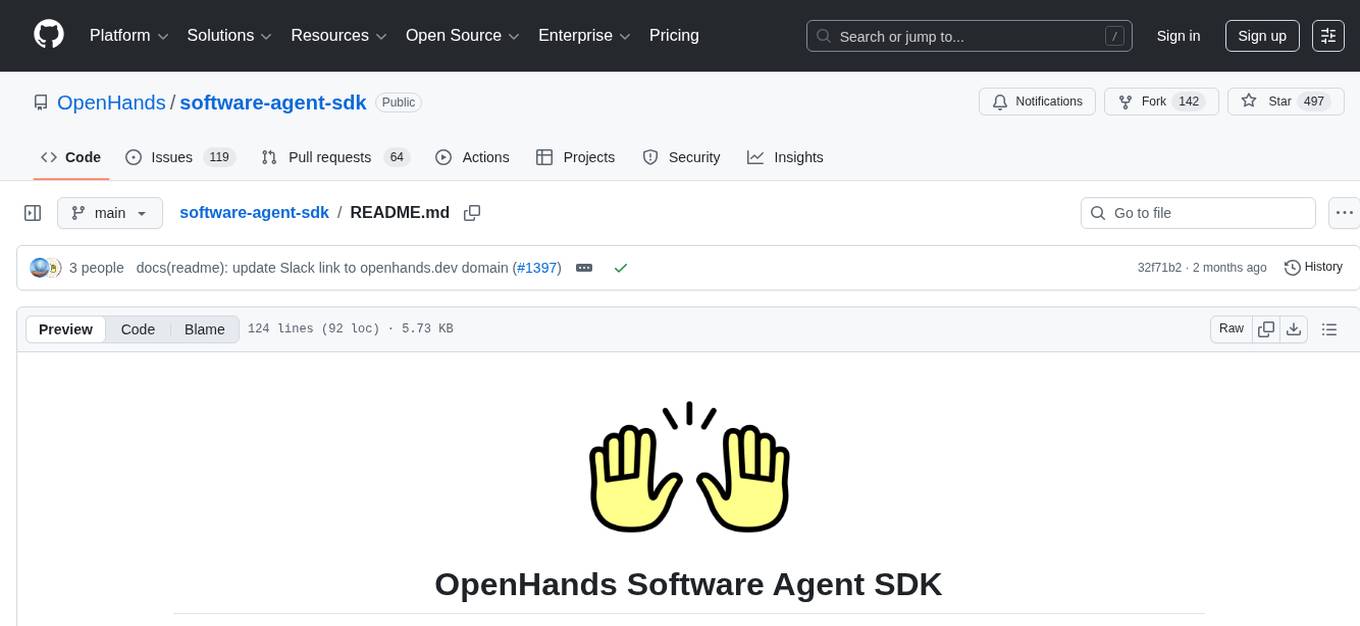
software-agent-sdk
The OpenHands Software Agent SDK is a set of Python and REST APIs for building agents that work with code. It allows users to perform one-off tasks, routine maintenance tasks, and major tasks involving multiple agents. Agents can use the local machine or run in ephemeral workspaces like Docker or Kubernetes. The SDK can also be used to create new developer experiences, powering tools like the OpenHands CLI and OpenHands Cloud.
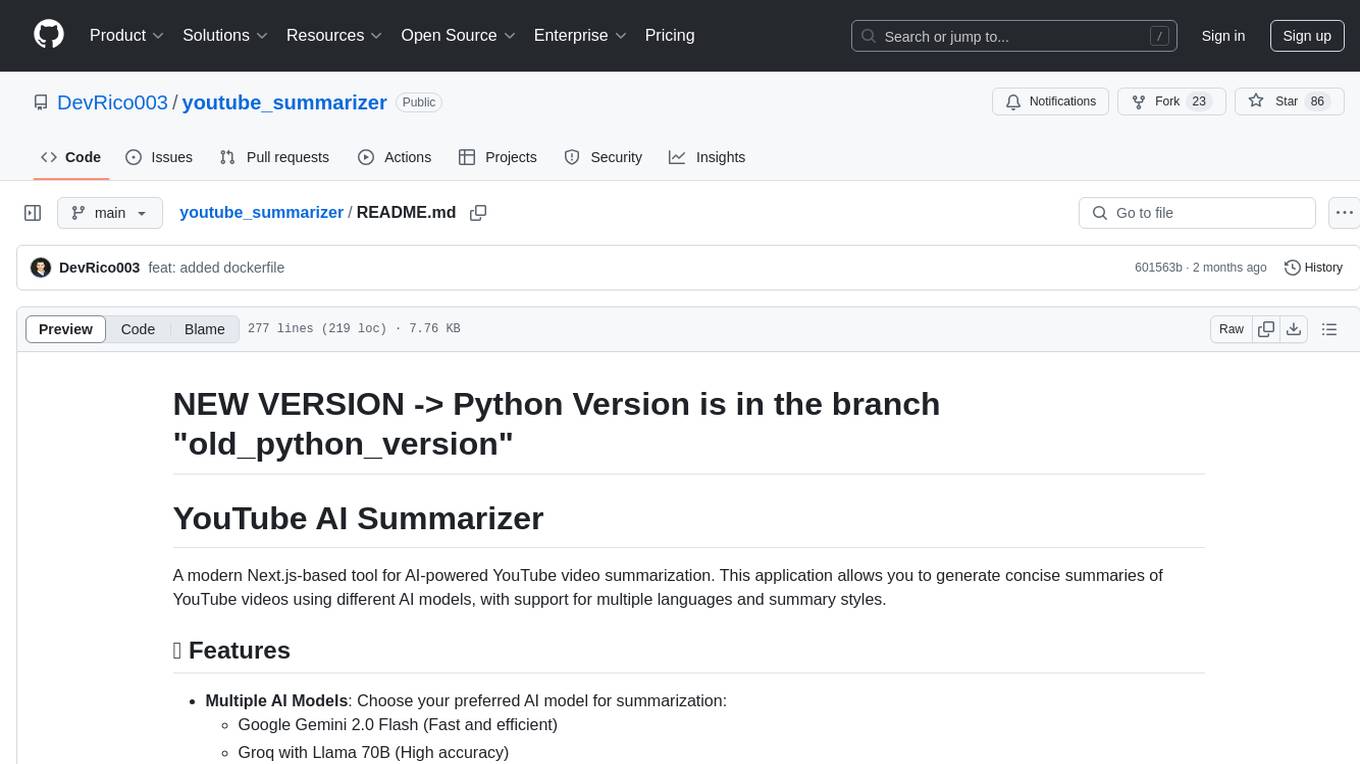
youtube_summarizer
YouTube AI Summarizer is a modern Next.js-based tool for AI-powered YouTube video summarization. It allows users to generate concise summaries of YouTube videos using various AI models, with support for multiple languages and summary styles. The application features flexible API key requirements, multilingual support, flexible summary modes, a smart history system, modern UI/UX design, and more. Users can easily input a YouTube URL, select language, summary type, and AI model, and generate summaries with real-time progress tracking. The tool offers a clean, well-structured summary view, history dashboard, and detailed history view for past summaries. It also provides configuration options for API keys and database setup, along with technical highlights, performance improvements, and a modern tech stack.
For similar tasks

aps-toolkit
APS Toolkit is a powerful tool for developers, software engineers, and AI engineers to explore Autodesk Platform Services (APS). It allows users to read, download, and write data from APS, as well as export data to various formats like CSV, Excel, JSON, and XML. The toolkit is built on top of Autodesk.Forge and Newtonsoft.Json, offering features such as reading SVF models, querying properties database, exporting data, and more.
For similar jobs

sweep
Sweep is an AI junior developer that turns bugs and feature requests into code changes. It automatically handles developer experience improvements like adding type hints and improving test coverage.

teams-ai
The Teams AI Library is a software development kit (SDK) that helps developers create bots that can interact with Teams and Microsoft 365 applications. It is built on top of the Bot Framework SDK and simplifies the process of developing bots that interact with Teams' artificial intelligence capabilities. The SDK is available for JavaScript/TypeScript, .NET, and Python.

ai-guide
This guide is dedicated to Large Language Models (LLMs) that you can run on your home computer. It assumes your PC is a lower-end, non-gaming setup.

classifai
Supercharge WordPress Content Workflows and Engagement with Artificial Intelligence. Tap into leading cloud-based services like OpenAI, Microsoft Azure AI, Google Gemini and IBM Watson to augment your WordPress-powered websites. Publish content faster while improving SEO performance and increasing audience engagement. ClassifAI integrates Artificial Intelligence and Machine Learning technologies to lighten your workload and eliminate tedious tasks, giving you more time to create original content that matters.

chatbot-ui
Chatbot UI is an open-source AI chat app that allows users to create and deploy their own AI chatbots. It is easy to use and can be customized to fit any need. Chatbot UI is perfect for businesses, developers, and anyone who wants to create a chatbot.

BricksLLM
BricksLLM is a cloud native AI gateway written in Go. Currently, it provides native support for OpenAI, Anthropic, Azure OpenAI and vLLM. BricksLLM aims to provide enterprise level infrastructure that can power any LLM production use cases. Here are some use cases for BricksLLM: * Set LLM usage limits for users on different pricing tiers * Track LLM usage on a per user and per organization basis * Block or redact requests containing PIIs * Improve LLM reliability with failovers, retries and caching * Distribute API keys with rate limits and cost limits for internal development/production use cases * Distribute API keys with rate limits and cost limits for students

uAgents
uAgents is a Python library developed by Fetch.ai that allows for the creation of autonomous AI agents. These agents can perform various tasks on a schedule or take action on various events. uAgents are easy to create and manage, and they are connected to a fast-growing network of other uAgents. They are also secure, with cryptographically secured messages and wallets.

griptape
Griptape is a modular Python framework for building AI-powered applications that securely connect to your enterprise data and APIs. It offers developers the ability to maintain control and flexibility at every step. Griptape's core components include Structures (Agents, Pipelines, and Workflows), Tasks, Tools, Memory (Conversation Memory, Task Memory, and Meta Memory), Drivers (Prompt and Embedding Drivers, Vector Store Drivers, Image Generation Drivers, Image Query Drivers, SQL Drivers, Web Scraper Drivers, and Conversation Memory Drivers), Engines (Query Engines, Extraction Engines, Summary Engines, Image Generation Engines, and Image Query Engines), and additional components (Rulesets, Loaders, Artifacts, Chunkers, and Tokenizers). Griptape enables developers to create AI-powered applications with ease and efficiency.











